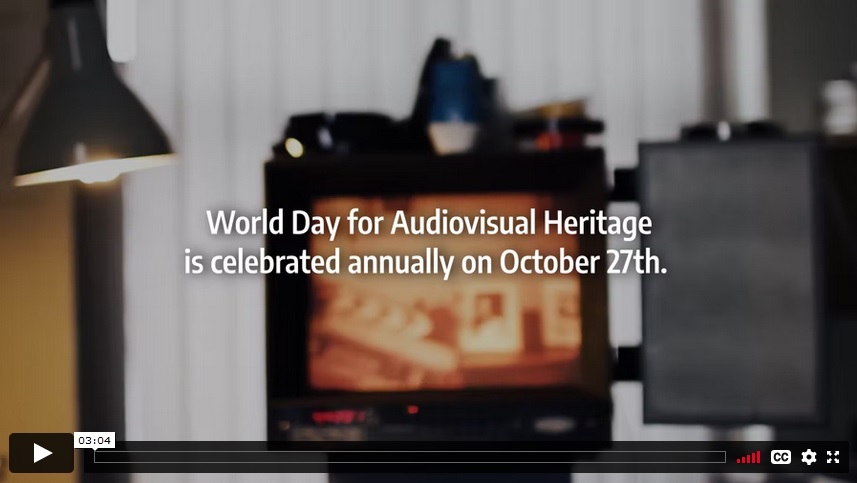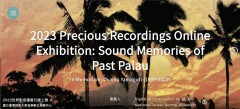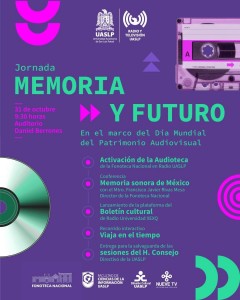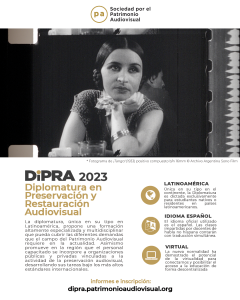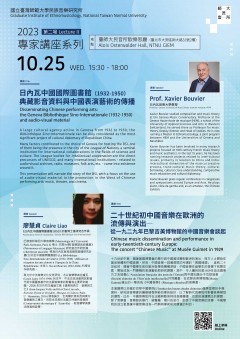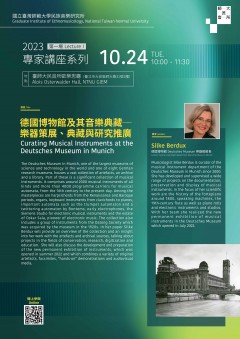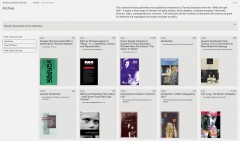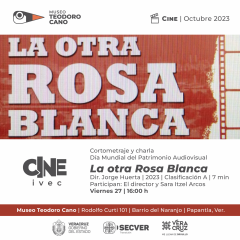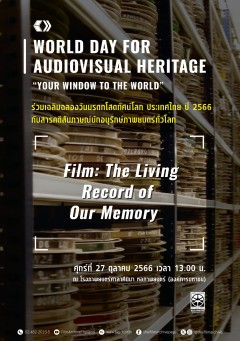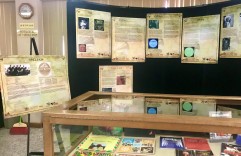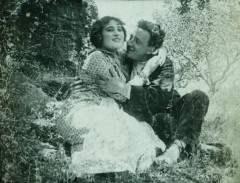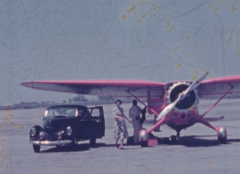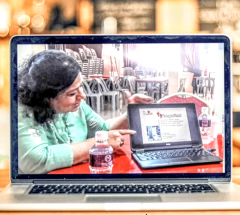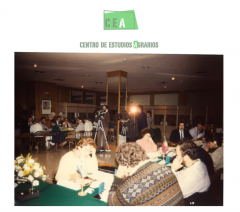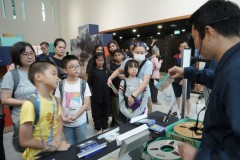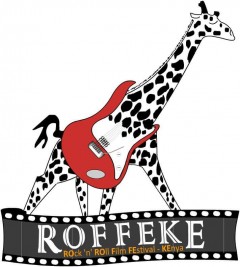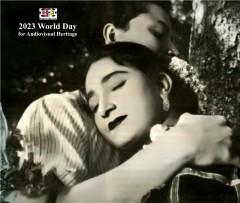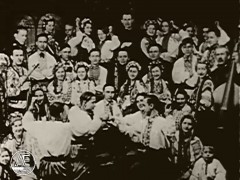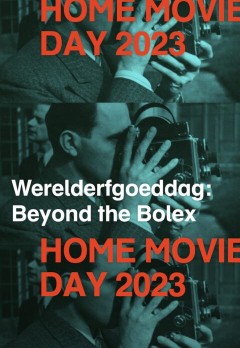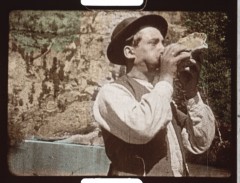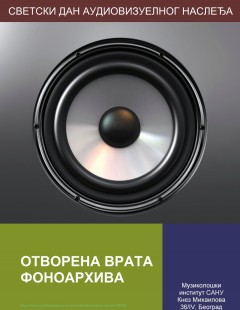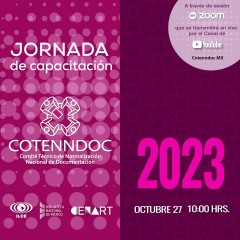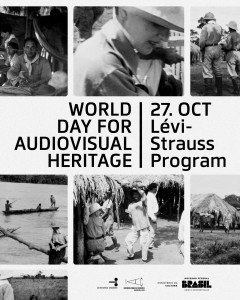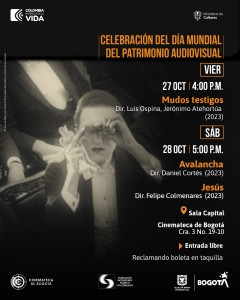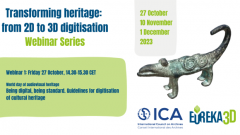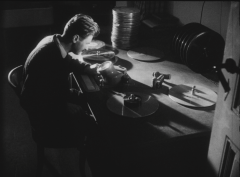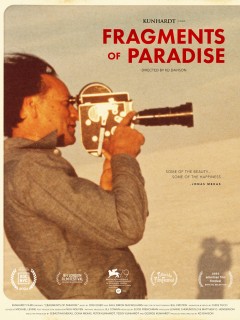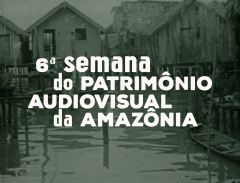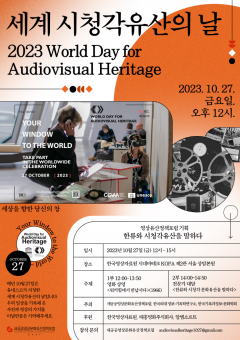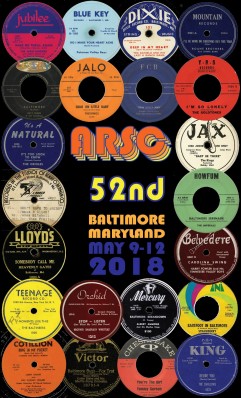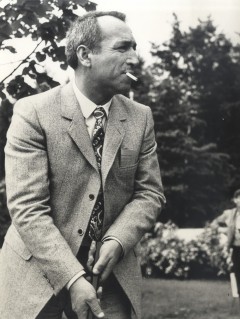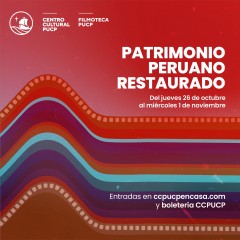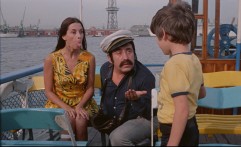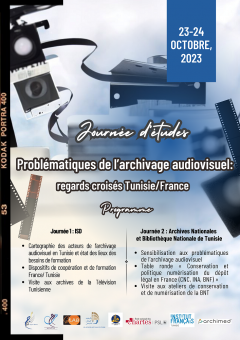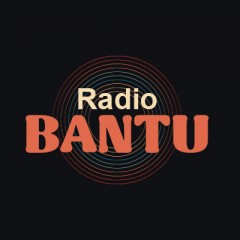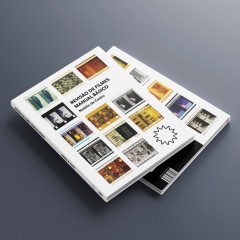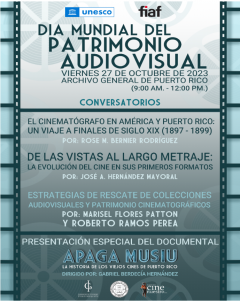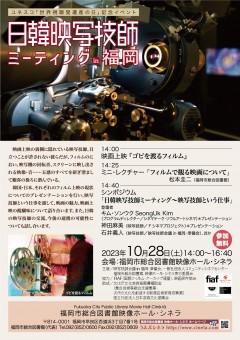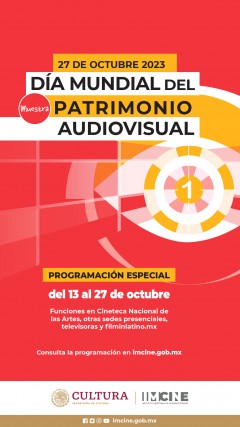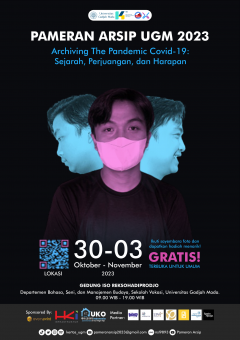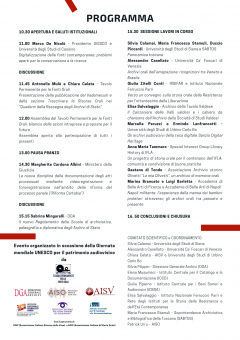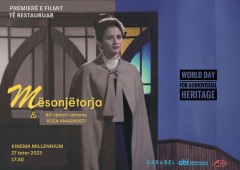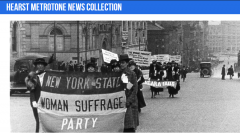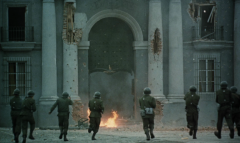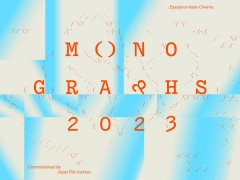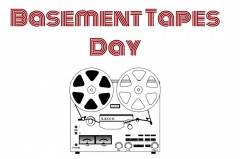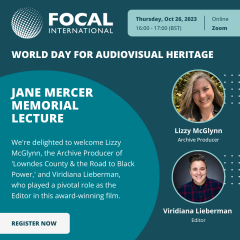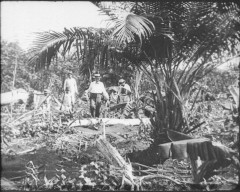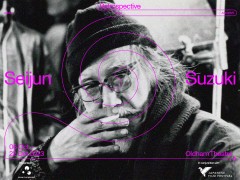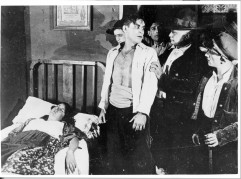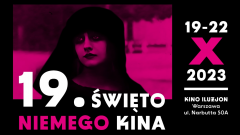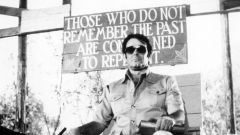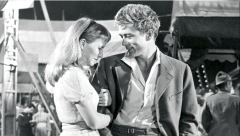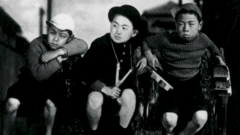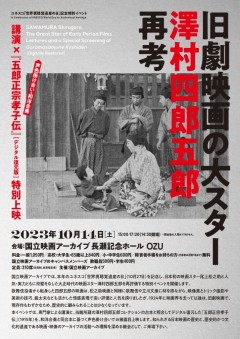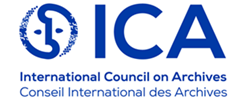2023 World Day for Audiovisual Heritage
To share information about your own celebrations, please click on the ADD A NEW EVENT button below.
The World Day for Audiovisual Heritage - 27 October - is key initiative for both UNESCO and the Coordinating Council of Audiovisual Archives Associations (CCAAA) to honour audiovisual preservation professionals and institutions that safeguard our heritage for future generations. Around the world audiovisual archives join together annually on this day to celebrate their work with events that not only highlight the vulnerability of these valuable materials, but also to celebrate the often, unheralded work of the institutions that provide protection and preservation, ensuring their availability in the future.
Audiovisual materials can tell your story, your truth, and your presence. They provide a window to the world, allowing us to observe events we cannot attend, hear voices from the past who can no longer speak, and craft stories that inform and entertain. By listening to recorded sounds and looking at images captured on film and video we can not only appreciate the richness of this culture but also learn from it.
Please join us by posting your events on this dedicated webpage to allow us to share in the wealth of stories and content from around the world.
Mary Egan, Chair of the CCAAA
Download, use, and share this year's poster:
Should you require one of the 2023 World Day for Audiovisual Heritage posters in another file format, or in another language, please contact info@ccaaa.org and we will try to help you.
Download, use, and share the promotional video:
You can download and share the World Day video by going to this dedicated page on the CCAAA website. You can also access it on YouTube.
You can now visualize all events of this year's World Day for Audiovisual Heritage on a dedicated world map that is updated in real time. You can also visualize all the notices ever posted about events celebrating the World Day for Audiovisual Heritage on the CCAAA website since the 2016 edition, on this webpage.
Share the news of your World Day celebrations:
The nine associations forming the CCAAA (AMIA, ARSC, FIAF, FIAT-IFTA, FOCAL International, IASA, ICA, SEAPAVAA, IFLA) strongly encourage all their members (and any other institutions) not only to join in the global celebrations of the 2023 World Day on and around 27 October, but also to share the information about their particular events, by clicking on "ADD AN EVENT" below and filling in the quick-and-easy form. Your descriptive text can be in the language of your choice (or even better... in several languages), but we ask you to limit it to 500 words max. You can also attach one image per event. Please fill in and submit one form per event. Your contributions will be automatically added to the list of Word day events at the bottom of this page (the latest added event will appear at the top of the list).
Happy 2023 World Day for Audiovisual Heritage !
2023 World Day for Audiovisual Heritage
To share information about your own celebrations, please click on the ADD A NEW EVENT button below.
The World Day for Audiovisual Heritage - 27 October - is key initiative for both UNESCO and the Coordinating Council of Audiovisual Archives Associations (CCAAA) to honour audiovisual preservation professionals and institutions that safeguard our heritage for future generations. Around the world audiovisual archives join together annually on this day to celebrate their work with events that not only highlight the vulnerability of these valuable materials, but also to celebrate the often, unheralded work of the institutions that provide protection and preservation, ensuring their availability in the future.
Audiovisual materials can tell your story, your truth, and your presence. They provide a window to the world, allowing us to observe events we cannot attend, hear voices from the past who can no longer speak, and craft stories that inform and entertain. By listening to recorded sounds and looking at images captured on film and video we can not only appreciate the richness of this culture but also learn from it.
Please join us by posting your events on this dedicated webpage to allow us to share in the wealth of stories and content from around the world.
Mary Egan, Chair of the CCAAA
Download, use, and share this year's poster:
Should you require one of the 2023 World Day for Audiovisual Heritage posters in another file format, or in another language, please contact info@ccaaa.org and we will try to help you.
Download, use, and share the promotional video:
You can download and share the World Day video by going to this dedicated page on the CCAAA website. You can also access it on YouTube.
You can now visualize all events of this year's World Day for Audiovisual Heritage on a dedicated world map that is updated in real time. You can also visualize all the notices ever posted about events celebrating the World Day for Audiovisual Heritage on the CCAAA website since the 2016 edition, on this webpage.
Share the news of your World Day celebrations:
The nine associations forming the CCAAA (AMIA, ARSC, FIAF, FIAT-IFTA, FOCAL International, IASA, ICA, SEAPAVAA, IFLA) strongly encourage all their members (and any other institutions) not only to join in the global celebrations of the 2023 World Day on and around 27 October, but also to share the information about their particular events, by clicking on "ADD AN EVENT" below and filling in the quick-and-easy form. Your descriptive text can be in the language of your choice (or even better... in several languages), but we ask you to limit it to 500 words max. You can also attach one image per event. Please fill in and submit one form per event. Your contributions will be automatically added to the list of Word day events at the bottom of this page (the latest added event will appear at the top of the list).
Happy 2023 World Day for Audiovisual Heritage !
Click HERE to open a new window with a printable version of the list below.
The main purpose of UNESCO’s World Audiovisual Heritage Day is to highlight the importance of audio-visual preservation and to promote the sharing of precious archival materials.
This year marks the first anniversary of the passing of ethnomusicologist Osamu Yamaguti (1939-2022). In response to the '2023 World Audiovisual Heritage Day,' the National Taiwan Normal University Digital Archives Center for Music has showcased Professor Yamaguti's fieldwork collection in Palau from 1965 to 1966. Through this event, we are sharing precious audiovisual assets of traditional Palauan music and dance with the world, once again commemorating the fruits of our happy triangular relationship in music preservation among Taiwan, Japan, and Palau.
(Chinese version of the website: https://openmuseum.tw/muse/exhibition/9a65e5b02f7849e53c3e0a3d9c582458)
On the 30th of October I created a activity for the local people of Serres, Greece in order to creatively teach about Audiovisual Heritage, it's importance and impact. To achieve this I started with introducing the topic with some basic facts about the day, like what it is about and why it is needed, and a clip the participants watched about the first spoken words on film in "The Jazz Singer" (1927). Afterwards the participants could choose a short movie they would like to watch, to inspire them for the following program, because now it was the participants turn to create a short film. The participants randomly picked one scene/setting and one sentence, that I prepared in advance, that they had to involve in their little movie (look video on Youtube https://youtu.be/Y3tynPUDDsc?feature=shared). After finishing recording their creative short movie, we had an after talk and they came to an conclusion on why it is important to preserve Audiovisual Heritage, to educate yourself on, learn from and enjoy the past/different cultures.
En el marco del día mundial del patrimonio audiovisual, se lleva a cabo la jornada "Memoria y futuro" en la Universidad Autónoma de San Luis Potosí.
Desde el Centro de Documentación Audiovisual de Radio y Televisión Universitaria, se realizan acciones de sensibilización, conservación y acceso.
En conmemoración del Día Mundial del Patrimonio Audiovisual exhibimos el trabajo que realizan estudiantes de la DiPRA (Diplomatura en Preservación y Restauración Audiovisual) bajo la consigna «Ventanas de Latinoamérica» siguiendo el lema de este año propuesto por UNESCO y el Consejo Coordinador de Asociaciones de Archivos Audiovisuales (CCAAA) para este día: «Su ventana al mundo».
In response to the '2023 World Audiovisual Heritage Day,' the Digital Archive Center for Music (DACM) at National Taiwan Normal University is organizing a series of lectures and an online exhibition to share audiovisual archives with the world. The lectures will explore the roles museums and libraries play in disseminating the archives of musical instruments and Chinese performing arts in Munich, Geneva, and Paris. The virtual exhibition will feature the late Japanese ethnomusicologist Osamu Yamaguti’s (1939-2022) collections of traditional music and dance of Palau from 1965-1966.
The second day of the lecture series commences with Professor Xavier Bouvier’s presentation. Professor Bouvier will recount the story of Geneva Bibliothèque Sino-Internationale (1932-1950), focusing on the use of audiovisual materials in promoting Chinese performing arts in the West: music, theatre, and cinema. Claire Liao, the postdoctoral research collaborator of the 'Geneva Bibliothèque Sino-Internationale,' will delve into the manuscripts preserved in the archives of the 'Institut des hautes etudes chinoises' in Paris. She will explore how the historical context influenced the selection of musical genres and discuss how Chinese music spread in France and other European countries.
In response to the '2023 World Audiovisual Heritage Day,' the Digital Archive Center for Music (DACM) at National Taiwan Normal University is organizing a series of lectures and an online exhibition to share audiovisual archives with the world. The lectures will explore the roles museums and libraries play in disseminating the archives of musical instruments and Chinese performing arts in Munich, Geneva, and Paris. The virtual exhibition will feature the late Japanese ethnomusicologist Osamu Yamaguti’s (1939-2022) collections of traditional music and dance of Palau from 1965-1966.
The lectures will begin with a talk by musicologist Silke Berdux on 'Curating Musical Instruments at the Deutsches Museum in Munich.' Berdux has been the curator of the musical instrument department since 2000. Her presentation will highlight the museum's projects in conservation, research, digitization, and education while discussing new initiatives in curating musical instruments.
International Webinar Series on Holistic Health, Well Being & Sustainable Development (IWSHHWBSD-2022-23)
Free Delegate/ Participant/ Speaker/ Presenter/ Panelist/ Resource Person/ Collaboration Registration Form : https://forms.gle/4ZpruoaRpy2hR1Pj8
Join Zoom Meeting
https://us06web.zoom.us/j/9705503767?pwd=Q1VKVGJOUG4vN1Y0MmNMQllKSk8wUT09
Meeting ID: 970 550 3767
Passcode: 2022
contact :
WhatsApp Coordinator : Dr. Ravindra R M @ 91 970 550 3767
Website : https://sites.google.com/view/internationalwebinarseries/
Website :https://www.sricasw.org/
GROSSSTADTSCHMETTERLING (DE/GB 1928/29. R: Richard Eichberg. 96 Min.)
In the spirit of the 2023 World Day for Audiovisual Heritage the DFF – Deutsches Filminstitut & Filmmuseum is presenting today at the Caligari Filmbühne, Wiesbaden, a digital restoration by the DFF: GROSSSTADTSCHMETTERLING (DE/GB 1928/29.) The film opened the 39th Bonn Summer Cinema - International Silent Film Festival in August to nearly 1,000 enthusiastic viewers, who were impressed by its leading actress Anna May Wong, the first major Hollywood star of Chinese origin. She plays Mah, a dancer who performs at a fair in Paris. When she is suspected of causing the fatal accident of a colleague, she finds refuge in the studio of the artist Kusmin. She falls in love with him, but her happiness does not last. The screening is accompanied by live music, played by Uwe Oberg. DFF-curator Dr. Eva Hielscher will be giving an introduction to the movie and the work that was required to restore it to its former glory.
The screening will take place at Caligari FilmBühne in Wiesbaden, Hesse.
In celebration of the 2023 World Day for Audiovisual Heritage the DFF – Deutsches Filminstitut & Filmmuseum will expand their collection of movies on Blu-Ray and DVD. In an effort to highlight their cultural importance and the role they play for film heritage, in a world that is increasingly relying on online streaming services, the DFF is accepting private donations of Blu-Rays and DVDs. The donations will be stored in the DFF-archives.
Those interested in making a donation may contact bibliothek@dff.film with information about the size of the collection and, if possible, an overview of the movies that are included. All movies are welcome regardless of country and release date (excluding television films and series).
On October 27th, the World Day for Audiovisual Heritage, the DFF – Deutsches Filminstitut & Filmmuseum is launching an online research archive with the works of renowned film scholar Thomas Elsaesser. Elsaesser, who passed away in 2019, entrusted his research archive, the Thomas Elsaesser Collection, to the stewardship of the German Film Museum. With the launch of its own website, the DFF is paying tribute to Elsaesser’s extensive scholarly work. At the outset, the website makes available a broad selection of publications from Thomas Elsaesser’s career, which spanned more than four decades. Gradually, scholars and film lovers will be able to access further materials from the intellectual estate of this important film scholar in this lively online archive with dynamic search functions and intuitive navigation options.
El fotoperiodista Jorge Huerta comparte el cortometraje "La otra Rosa Blanca" y además una charla con la Maestra Sara Itzel Arcos, en la que abordaremos aspectos del Patrimonio Audiovisual haciendo visible la importancia de preservar el cine, programas de radio, televisión y grabaciones diversas, que constituyen nuestra identidad como sociedad y van conformando el patrimonio audiovisual de los pueblos.
Te esperamos a las 16:00 horas, en el auditorio de este recinto, la entrada es libre.
On Friday, October 27, 2023, the Thai Film Archive (Public Organization), with the support of the Museum and Archive of the Public Department of Thailand, Channel 7 TV station, and alliances, will commemorate the World Day for Audiovisual Heritage 2023. We will celebrate this special occasion with a screening of the film, "The Living Record of our Memory," which highlights the often unsung but vital roles played by film archives worldwide.
Following the screening, there will be a small discussion to engage with our audience and gather their thoughts on the evolving and expected roles of archives in the present day.
Suara Puan (Her Voice) is an original soundtrack of Devising Ratna Asmara - a historical documentary film that tells the research journey of Kelas Liarsip on tracing Ratna Asmara. Ratna Asmara is an Indonesian first female director who had been forgotten by the history. In this documentary, we could see the process of gaining archival documents and repairing-digitizing Ratna Asmara's film Dr. Samsi (1952) - her only remain film.
The song was created by M. Cristna Irama and Arief Fauzan Vibriansyah.
Sing by Nesia Ardi.
The song was produced, directed, mixed by M. Cristna Irama
The Concept of Video Lyrics by Abersyah Ruswandono, Sabila Nurbayani, Julita Pratiwi, and Halim Lubis.
Edited by Halim Lubis.
Credit of Footage Material - Merangkai Ratna Asmara | Sinematek Indonesia | Eye Film Institute
World Day for Audiovisual Heritage 27 October:
National Archives of Trinidad and Tobago presents Calypso Recording History Exhibition
In commemoration of World Day for Audiovisual Heritage on 27 October, and Calypso History Month, the National Archives is pleased to feature an exhibition on Trinidad and Tobago’s Calypso Recording History, from 26 October 2023 to 3 November 2023. The exhibition will be held in the Public Searchroom at its premises on 105 St. Vincent Street, Port of Spain.
The exhibition traces the development of Trinidad and Tobago’s calypso recordings from 1912 to the 1950s, including the first instrumental and vocal recordings, the role of local and overseas recording companies and studios, as well as showcases the evolution of audio formats and playback machines used to record and play music.
Calypso recordings are an integral part of Trinidad and Tobago’s intangible cultural heritage, not only as a musical form, but also for the veritable way in which they document in song, our social, political, economical, and linguistic realities at various periods in time.
As a window to the world, audiovisual heritage enables us to witness events we do not attend, listen to voices of the past, learn parts of our history that are no longer accessible, and create narratives that inform and entertain.
The annual World Day for Audiovisual Heritage, commemorated annually since 2006, reminds us of the importance of archiving and preserving audiovisual sources before it is too late. Audiovisual heritage, especially for post-colonial nations, is one of the most authentic and true-to-life ways of preserving Trinidad and Tobago’s unique and evolving national identity and collective memory.
New Video Series from the United Nations
STORIES FROM THE UN ARCHIVE
A Breathtaking Collection of Major Moments of UN History
United Nations, New York (October 27, 2023)—Colin Powell’s infamous ‘weapons of mass destruction’ speech to the United Nations Security Council. Fidel Castro delivering one of the longest addresses the world has ever heard. Presidents, prime ministers, popes and queens. Pop stars, rock stars and superstars – glimpses of hope from principled people and young activists on the global stage. Harrowing accounts of loss and tragedy, and unknown moments and breakthrough agreements from the past. Nuggets of history captured for anyone who cares about the forces of the past and the portents for the future.
This is Stories from the UN Archive, a new series that gives viewers a front-row seat on the iconic moments that shaped our common destiny.
Drawn from a wealth of footage, much of it recently digitized and never before widely seen, the series encapsulates key inflection points—some that resonated in their day, and some that have rich new meaning when viewed with hindsight.
The UN’s audiovisual collection has approximately 6,330 hours of 16mm and 35mm films, 49,400 hours of video recordings, and 18,000 hours of audio chronicling the activities of virtually every recognizable name in the past century of global politics, along with many from the realms of religion, activism, academia, the arts and more.
“The AV archives have contents not available in any other source and they can be used to tell the audiovisual history of the Organization,” explains Antonio da Silva, Acting Chief of the UN’s Audiovisual Services Section.
He points out the critical value of accurate historical materials amid the current deluge of false and deliberately misleading content. “During a time of widespread misinformation and disinformation with the use of social media to spread fake news, it is crucial to safekeep trustworthy AV archives sources with accuracy and completeness.”
Mass digitization of the A/V collection began in 2016 thanks to a $4.5 million donation from the Government of Oman with a view to preserving, archiving and making publicly accessible via the AV Library website approximately 70 percent of the historic film, video and audio recordings covering the history of the United Nations from its inception to the mid-2000s. Alongside the UN Photo Library, more invaluable historic materials become accessible every day.
Be a Part of Making History by Showing History
The Series welcomes promotion through links within YouTube—either as suggested content, through the Community feature, or with coverage—or beyond YouTube on broadcasts, podcasts, Instagram, X, TikTok and other social platforms. All materials are free of charge. We also welcome broadcast, digital and museum partners around the world.
Hosted on @UNStory on YouTube at https://www.youtube.com/playlist?list=PLARfz3-vanazCXdYz12iOJOSJF3UfKbj-, the series itself can be promoted with this teaser: https://www.youtube.com/watch?v=aLL2JkNAX5A
For more information, please contact:
Ilona Auth (auth@un.org), Creative Archival Preservation and Production, United Nations Video, News and Media Division, Department of Global Communications.
Fang Chen (fchen@un.org), Chief, Partnerships Unit, News and Media Division, Department of Global Communications.
In celebration of World Day for Audiovisual Heritage on October 27th, Moving Image Research Collections at the University of South Carolina (MIRC@USC) presents a “Window to the World by Amateur Women Filmmakers”. This curated online screening compiles home movies from the 1920s to the 1970s shot by women as they travel the globe with their families and friends, providing us with a window on their explorations and adventures. These films were screened during the Home Movie Day celebrations on October 21st, and will be posted on the MIRC YouTube channel on October 27th to celebrate the World Day for Audiovisual Heritage.
“Embrujo is the most difficult film to classify in Spanish cinema and is one of
the most singular ever made in the industry, especially taking into account
the historical moment when it appeared”. These words by the music and film
critic José Luis Tellez about Carlos Serrano de Osma’s film give us a good idea
of the kind of artistic object we have before us. Embrujo is a unique film, a
cross between musical drama and avant-garde experimentation, described
by its director as an attempt to “reach the darkness of the unconscious
through the shining pathways of folklore”.
The copy was restored by Filmoteca Española
Kode is a drive of KauseKonnect Global mentored by Dr Ms Kamal S Saxena. It aims to digitalise information and share it on platforms for easy access pan global. Impriny a compilation of lesser known places where Mahatma Gandhi stayed or visited during his 700 days in New Delhi is a first endeavour in this direction
We are soft launching the initial collaborative editing document for
IASA-TC 07 the IASA Guidelines for the Preservation of Born-Digital Video. IASA Guidelines are used around the world as international standards for handling, managing, and digitising audio and video carriers.
Developing the IASA-TC 07 Guidelines
Work on IASA-TC 07 marks a change in the approach to how IASA Guidelines are developed. This will be a collaborative authoring effort. Anyone can contribute to the creation of IASA-TC 07. To gain commenting or editing access, prospective contributors will need to register via the email address: borndigitalvideo@gmail.com
Cinemateca Portuguesa is once again celebrating the World Day for Audiovisual Heritage, commemorated annually on October 27. On the same day, in 1980, the UNESCO Recommendation for the Safeguarding and Preservation of Moving Images was approved by the General Conference at its 21st session in Belgrade. In 2023, Cinemateca Portuguesa will celebrate the date with a great classic, SPELLBOUND, by Alfred Hitchcock, to be screened in a restored digital copy.
Under the same spirit, Cinemateca Portuguesa will pay homage to some of the key figures of the Portuguese cinema history on October 30, in an initiative proposed by the Government of Portugal through the Ministry of Culture. Cinematographer Acácio de Almeida, late producer António da Cunha Telles, actresses Isabel Ruth and Manuela de Freitas, filmmakers Manuel Faria de Almeida and Margarida Cordeiro will be awarded Medals of Cultural Merit in Cinema. The ceremony will be followed by the screening of the new digital copy of ROSA DE AREIA (1989), a film by António Reis and Margarida Cordeiro.
Since its inception in 1985, the Lebanese Brodcasting Corporation International (LBCI) has contributed to enriching the audiovisual heritage of Lebanon and the Arab World, through its breakthrough coverage of news and the production of entertainment shows that have marked more than one generation. Today, the LBCI's archives library is a true testimony of the history of Lebanon and its audiovisual landscape, a heritage that the broadcast channel recognizes as one of its key assets, between past and future.
On the occasion of the World Day for Audiovisual Heritage, the LBCI has made the choice to valorize its own archives, by highlighting their uniqueness and their current use in the day-to-day operations of the channel. For that purpose, a series of reports will be produced for the different news bulletinw, to highlight the improtance of this world day round the globe, how different institutions in Lebanon are multiplying their endeavors to preserve their own archives, and the richness of the LBCI audiovisual heritage which is duly preserved with a dedicated team.
On another hand, on the morning of 27 October, LBCI's landmark morning show, titled "Morning Talk", will address the topic through live phone calls from the public, as well as a series of reports and authorized guests.
Throughout the day, a series of clips with key TV moments from LBCI's own library will be aired, a reminiscence of Lebanon's golden audiovisual history, and a call to preserve our past in order to read better the present and prepare the future in a region constantly marked by uncertainties.
The reports, shows and clips produced will be broadcast on LBCI's linear satellite channels, as well as its digital VOD platform www.lbcgroup.tv and its multiple and widely followed social media accounts.
Como conmemoración del Día Internacional del Patrimonio Audiovisual 2023, el Centro de Estudios Agrarios, dependiente de la Consejería de Agricultura, Ganadería y Desarrollo Sostenible de la Junta de Extremadura (España), ha realizado una pequeña exposición con material de sus fondos audiovisuales en el vestíbulo de los Servicios Centrales en Mérida.
Nuestra Consejería contó, hasta el año 2017, con un negociado para la realización y montaje de reportajes gráficos y documentales en vídeo de todos los actos y eventos organizados por esta o a los que asistían sus autoridades, así como de producciones científicas o técnicas relacionadas con las competencias propias de la entidad. La labor desarrollada por este negociado dio lugar a un cuantioso fondo documental que recoge la historia reciente en imágenes de la administración del campo y de la región en general, pues se fueron también recopilando por este negociado todos los vídeos producidos por la Junta de Extremadura, dando lugar a la formación de una interesante videoteca.
Este negociado heredó las funciones propias que realizó, hasta mediados de los 80 del siglo XX, personal del Servicio de Extensión Agraria, ya en la sede ministerial, en Madrid, como en las unidades periféricas que este Servicio tenía en Badajoz.
Posteriormente, pasó a depender de la Dirección de Estructuras Agrarias, concretamente del Servicio de Extensión y Capacitación Agraria (SEYCA), para terminar en los noventa dependiendo del Servicio de Recursos Humanos y dentro de una Sección, la de Publicaciones e Imprenta.
Actualmente estos fondos audiovisuales (fotografías, vídeos VHS y Beta, películas, grabaciones de másteres en diversos formaros), se encuentran en los Archivos del Centro de Estudios Agrarios y en la Filmoteca de Extremadura, y se lleva a cabo su proceso de descripción, catalogación y digitalización.
The National Archives of Singapore organised a children's programme on 23 September 2023. Titled Archives Explorer - Rewind That Record, the programme was divided into two parts. During the first part, Audiovisual Archivist June Pok delivered a talk on the history of audiovisual media and showcased some of our nostalgic TV commercials. The second part was a demonstration workshop where the children had the opportunity to handle the various audiovisual equipment on display and learn more about the fascinating audiovisual records that the National Archives of Singapore holds, such as VHS, U-matic tapes, cassette tapes, and CDs. The session was attended by approximately 45 people.
In May 2023, during the Africans Rising "Africa Liberation Week" which included the commemoration of Africa Day, ROFFEKE put together a YouTube playlist that showcased short films by and/or about Africans in the continent and in the diaspora. They include:
CROSSING BORDERS (South Africa)
"Bhongo Mhlope, a South African immigration agent is on the hunt for a Zimbabwean foreign national who has been scheduled for deportation. He calls in the help of Benny, a police detective and old friend. After the successful apprehension of his 'target', Bhongo and Benny discuss a greater menace growing in the town of George."
FINDING LULU (USA)
"After learning about the culture of school shootings in America, Lulu’s Kenyan community bands together to prepare her for life in U.S. schools."
TAP (Kenya)
"Cheating in relationships has been heightened by the advancement of technology. TAP is a drama about how a young couple compromise on their relationship by failing to communicate, instead, each of them is an unfaithful."
PHAT Girl (USA)
One Single Rose: "In 2013 I was approached to pen a piece for a plus size debutante ball which brought the spoken word piece PHAT Girl to life. Since that time, young and well-seasoned beauties have requested that I perform this piece at their events. Knowing that most women deal with low self-esteem, PHAT Girl is testament to becoming comfortable in our skin, loving who we are flaws and all. PHAT Girl premiered at the Piton International Film Festival on August 16, 2017 in St. Lucia and now I’m spreading the word that it's past time for us to get comfortable in our skin. It's time for us to embrace all of our flaws. It's time to own the fact that we are all fabulous--big, short, small, tall, dark, light--"
LOSING MY PRIDE (Nigeria)
"Natasha has great prospect and dreams for herself and her generation, but all crashed when her dreams were cut short"
THE FLAME YOU KEEP (USA)
"The Flame You Keep chronicles the plight of refugees across the globe."
BEVERLEY (UK)
"Beverley follows a mixed race girl's struggle to carve out a sense of identity in a confusing, shifting cultural landscape - 1980 Leicester. A move from the decaying, poverty-stricken, urban environment to the relative comfort and theoretical safety of white suburbia does not provide the hope and opportunities Bev may have wished for. A familiar enemy is ever present - a threat that extends beyond her own safety, as she must also protect her brother and sister. By asserting her will and using her guile Bev tries to shape her new environment into something palatable, but the result is the opposite of what she is trying to achieve."
MARRYING THE DEVIL (Zimbabwe)
"Makanaka...is lured by peer pressure, desperation and the love for material gains to abruptly marry her charming boyfriend Evans. Unbeknown to her the wedding is just but a sacrificial ceremony..."
ROFFEKE Borderless Africa YouTube Playlist Link: https://www.youtube.com/playlist?list=PLd6abM5w6TUkSu8J9sRjD67jg0rPFvWFG
Με αφορμή την Παγκόσμια Ημέρα Οπτικοακουστικής Κληρονομιάς, το Πολιτιστικό Ίδρυμα Ομίλου Πειραιώς (ΠΙΟΠ) και το Αρχείο της ΕΡΤ ΑΕ παρουσιάζουν, την Παρασκευή 27 Οκτωβρίου 2023 (ώρα 17:30), σειρά οπτικοακουστικών τεκμηρίων με θέμα την ελληνική βιομηχανική κληρονομιά, στο Κτήριο του Ιδρύματος, στον Ταύρο.
Τι στοιχεία μπορούμε να αντλήσουμε από οπτικοακουστικά τεκμήρια και πώς αυτά μπορούν να λειτουργήσουν ως ιστορικές πηγές για τη βιομηχανική κληρονομιά και την ανάπτυξη στη χώρα; Μέσω των οπτικοακουστικών τεκμηρίων που θα προβληθούν, περιγράφονται σχέδια και εξελίξεις σχετικά με την ανάπτυξη της μεταπολεμικής Ελλάδας. Οι βιομηχανικές εγκαταστάσεις, ο εξοπλισμός και οι εργαζόμενοι, η παραγωγή και τα προϊόντα, αλλά και οι στοχεύσεις της κρατικής οικονομικής πολιτικής και οι εταιρικές στρατηγικές ανάπτυξης έχουν καταγραφεί στην κινηματογραφική παραγωγή, η οποία φωτίζει την εικόνα της βιομηχανίας και ολοκληρώνει, σε συνδυασμό με τις γραπτές πηγές, το σχετικό ιστορικό αφήγημα.
Θα παρουσιασθούν με σχολιασμό από τους μελετητές τους, τα εξής:
Blueprint for progress, παραγωγή: Ελληνική Τράπεζα Βιομηχανικής Αναπτύξεως (25΄),
Η ελληνική γαλακτοβιομηχανία, παραγωγή: Αγροτική Τράπεζα της Ελλάδος (5΄),
Ελληνικά Ναυπηγεία Σκαραμαγκά, παραγωγή: Ελληνική Τράπεζα Βιομηχανικής Αναπτύξεως (8΄)
Μανόλης Αρκολάκης, Δρ Ιστορίας, Ένα όραμα για τη βιομηχανική ανάπτυξη της μεταπολεμικής Ελλάδας
Ελληνική Βιομηχανία, παραγωγή: Γενική Διεύθυνση Τύπου και Πληροφοριών, επιμέλεια: Ινστιτούτο Μορφωτικού και Επιστημονικού Κινηματογράφου Κούνδουρος Ρούσσος: Διεύθυνση Παραγωγής (12΄)
Αποσπάσματα από ταινίες Επικαίρων των δεκαετιών 1950-1970, παραγωγή: Υπουργείο Τύπου & Πληροφοριών και Γεωγραφική Υπηρεσία Στρατού (ΓΥΣ) (20΄)
Εμμανουήλ Γεωργουδάκης, Φιλόλογος-Ιστορικός Τέχνης, Φιλοτελικό και Ταχυδρομικό Μουσείο, Διδώ-Δανάη Γεωργούλα, Ιστορικός-Τεκμηριώτρια, Αρχείο ΕΡΤ, Ταινίες επικαίρων ως πηγές βιομηχανικής ιστορίας
Η συμμετοχή στη δράση είναι δωρεάν.
Απαραίτητη η δήλωση συμμετοχής, στο τηλέφωνο 210 3418051, Δευτ.-Παρ. 10:00-17:00
ΠΙΟΠ | Ιστορικό Αρχείο
Δωρίδος 2 & Λεωφόρος Ειρήνης 14, 17778, Ταύρος
Τ.: 210 3418051 | www.piop.gr
Echoing the World Day for Audiovisual Heritage (WDAH), the Taiwan Film and Audiovisual Institute (TFAI) hosts a series of events on October 27 every year. Through our restoration, archiving, research and promotion, we hope to not only attract the public's attention to Taiwanese audiovisual heritage but also inspire their active participation in its preservation.
To mark the 10th anniversary of TFAI's dedication to digital restoration, the institute is inviting the audiences to re(experience) its first restored collection on the big screen: Love and Duty, A Trip Through China, The Ordinary Scenes from Deng Nan-guang's Collections: Taipei Image, Dragon Inn and Four Moods. The screening of Love and Duty will be accompanied by Piān-sū performance or live music.
The world premiere of the newly restored films by the distinctive director LIN Fu-ti, The Love in Okinawa, and Sunset Over the Horizon will be held on 27-28 Oct. These film elements were acquired from the Four Star Cinema in Chinatown, San Francesco in 2019, which are the few remaining colour Taiwanese-language films.
The finest works carried out by fellow archives, and hidden gems from around the world will also be highlighted, and introduced by a special guest during the week of celebration.
To help the audiences dive into the history of cinema, and experience its diversity and richness, TFAI is presenting a selection of activities - workshops, a symposium, an outdoor screening, Budaixi (glove puppet theater), and children's activities - with free entrance. An indispensable way to discover the cinema of yesterday!
More information: https://youtu.be/McjHEityxo8
Bangladesh Film Archive (BFA) would like to set a programme to celebrate the 2023 World Day for Audiovisual Heritage in an enthusiastic way including screening a renowned film of this sub-continent released in the 1960s named Asiya. A Poster Display event also is organized which will reflect the consecutive history of Bangladeshi film and culture.
This year BFA will promulgate the event titled `Retaining the Past Through the Film’ (চলচ্চিত্রের মাধ্যমে অতীতকে ধারন). The programme will be organized at the Projection Hall (2 level) of BFA premises.
The day’s programme will be inaugurated with a screening of the featured film `Asiya’. This black and white Film was released in 1960, based on the contemporary rural life of the people of this region. It is the symbolic presentation of an unconsummated tragic love story. The film was produced and directed by renowned film director, producer and actor Fateh Lohani. Ms. Sumita Devi has starred in the main role (heroine) and Shaheed, Kazi Khalek, Prabir Kumar, Bhavesh Mukherjee also played supporting roles in the film. Sumita Devi was a veteran actress who was also an artist at the Swadhin Bangla Betar Kendra in our great liberation war in 1971. The film won the `President Award’ of the then Pakistan as the best Bengali film category. BFA belongs to the film’s original print and it has been already transferred into digital format also. Lots of still pictures, posters and allied materials of this film collected by BFA and preserved for longtime conservation as well.
The daylong program will be inaugurated by Mr. Zashim Uddin, Director General of Bangladesh Film Archive, Dhaka, Bangladesh.
Il KIWANIS è un'organizzazione di volontariato che lavora per aiutare i bambini da oltre un secolo. Il suo motto è "servire i bambini del mondo". Ogni anno, il quarto sabato di ottobre, i Club organizzano il "KIWANIS One day", un momento in cui i Soci di tutti i Club del mondo si dedicano ad un'attività per aiutare i più piccoli.
Nel 2023, in questa giornata, il Kiwanis Club E Gialai di Palermo che fa parte del Distretto Kiwanis Italia San Marino, ha deciso di realizzare una trasmissione radiofonica con gli studenti di una scuola e parlare con loro dell'importanza del Patrimonio Audiovisivo. Un modo per onorare i professionisti e le istituzioni della conservazione audiovisiva e imparare l'importanza del patrimonio audiovisivo per le generazioni future. Un patrimonio che è come una finestra sul mondo che permette a tutti, oggi e domani, di conoscere com'era il passato, di ascoltare le voci del passato e di crescere culturalmente. Il patrimonio audiovisivo ha un valore inestimabile. È la prova della nostra memoria collettiva. È una preziosa fonte di conoscenza. Ma soprattutto è la prova dell'importanza della diversità culturale, sociale e linguistica che va oltre gli stereotipi e l'essere tutto uguale. Preservare questo patrimonio e garantirne l'accessibilità al pubblico e alle generazioni future è un passo fondamentale per le generazioni future e per tutti noi.
On October 27, we celebrate the World Day for Audiovisual Heritage (World Day for Audiovisual Heritage), which is designed to promote a deeper understanding of the unique role of audiovisual archives and the need to protect and preserve them as part of the world's cultural heritage.
The Central State Audiovisual and Electronic Archive joins international efforts to promote the values of audiovisual heritage by displaying its collections that tell the stories of people's lives and reflect the development of national culture.
One of the collections of the archival collection is film documents, the total number of which is more than 12,700 units of accounting. These are film magazines, special issues, film and television plots, documentaries and popular science films, performance films, concert programs, etc., created by domestic and foreign film and television studios.
Among them are film documents on 16-mm film, the 100th anniversary of which is being celebrated this year.
In the mid-1990s, the Institute of Art History, Folklore and Ethnology named after M. Rylsky National Academy of Sciences of Ukraine handed over film documents on 16-mm film from the collection of Ukrainian choreographer and cinematographer Vasyl Avramenko, who lived and worked in emigration in 1921–1981, to the archive for state storage. The collection includes documentaries and film plots from the early 1930s to the end 1970, which reproduce various spheres of life of Ukrainian communities in the cities of the USA and Canada, and also represent the creative activity of the artist who was called the "Father of Ukrainian dance".
On the occasion of the international holiday, we bring to the attention of users fragments of film plots from the 1930s from the collection of Ukrainian choreographer Vasyl Avramenko, which give an idea of the rich cultural heritage of Ukrainians and constitute a significant source research and informational potential.
On the annual UNESCO day for world audiovisual film heritage, Eye Filmmuseum is screening Beyond the Bolex: a documentary by Alyssa Bolsey about the iconic 16mm camera that brings family and film history together.
On Saturday 28th Oct., Eye will continue celebrating the history of global audiovisual heritage combined with Home Movie Day, with two screenings. 2023 marks the centenary of two small gauge formats; Pathé Baby 9,5mm and 16mm.
Various presentations will be held at Eye: Film restorer Brigitte Paulowitz will be showing archival and amateur films from the Lichtspiel/ Kinemathek Bern collection, accompanied by live music by Martin de Ruiter. In her presentation, Paulowitz will talk about aspects such as the breadth of the range offered by the Pathé catalogue in the early period 1922/23, the Pathécolor process and stencil coloring, as well as the practice of screening and development for this special format. Ole Schepp and Harry Bruno, filmmakers and board members of the Netherlands Association Cine-9.5, will then screen a selection from their own film collection on a Heurtier projector.
To celebrate the 16mm film format, analogue screenings of specially commissioned films by Film Academy students supervised by Wim van der Aar (film director and collector of amateur films) held at Eye film collection are on the program. Introduced by Mike van Rossum (Film Academy) and Rommy Albers (curator, Eye).
All three screenings are free of charge and open to all public.
Silent film pearls; live music by Wieslaw Pipcynski.
For the last two years, Lichtspiel had its attention on the 100th birthday of 9.5mm. We would like to dedicate a last event to the extended anniversary of the formate showing stencil colored purchase films and very early private film material. Amateur films invite us us on a boat trip on the Tarn River in the South of France, we will travel and be surprised by crocodile hunters and carnivorous plants, a documentary film will take us to Trouville, the queen of the beaches.
Live music: Wieslaw Pipczynski
The open day of the phonoarchive of the Institute of Musicology SASA is an opportunity for the general public to get to know the various sound carriers on which documentary recordings were made, primarily Serbian traditional folk and Orthodox church music - from wax records to today's digital field recordings. Also, the process of rerecording tapes and audio cassettes, which is the focus of digitization this year, will be demonstrated.
Ethnomusicologist Dr. Marija Dumnić Vilotijević will hold a lecture (in Serbian) on the phonoarchive of the Institute of Musicology SASA on Friday, October 27th, 2023, in two sessions - from 12 and from 14 h. The project "Digitization of sound material of the Institute of Musicology of the Serbian Academy of Sciences and Arts" was supported this year by the Ministry of Culture of the Republic of Serbia, and during the lecture, musicologists Miloš Bralović, Ph.D. and Stefan Savić, MA, will talk about selected examples from the digitized parts of the collections of Dragutin Gostuški and Dimitrije Stefanović.
The entrance is free and we kindly ask that you announce your arrival to the secretariat of the Institute of Musicology SASA at music_inst@music.sanu.ac.rs by Thursday (October 26th, 2023), so that we can organize space capacities. Welcome!
Since 2009, Hong Kong Film Archive has been in support of World Day for Audiovisual Heritage.
This year, in support of the annual 'World Day for Audiovisual Heritage' and to enhance public recognition of the importance of preserving our audiovisual heritage, the Hong Kong Film Archive is screening the 4K restored version of The Wild, Wild Rose (1960), one of the Archive's '100 Must-see Hong Kong Movies'.
Film restoration breathes new life into cinematic treasures, augmenting the viewing experience of many generations to come. The Wild, Wild Rose is the second 4K digitally restored film by the Archive [the first being The Valiant Ones (1975)]. The film elements were acquired from the Cathay Organisation in Singapore and while they have not suffered major damage, the image contrast is very large, with scratches and black-and-white flecks typical of old prints. Also, most of the film is set at night inside nightclubs and details of darker and shadowy scenes have diminished. After digital restoration and colour timing, much details and texture of the original version are refurbished.
The world premiere of the 4K restored version of The Wild, Wild Rose had been made on Sunday, 30 July at the Grand Theatre of the Hong Kong Cultural Centre. In addition, there will be a special screening on Friday, 27 October 'World Day for Audiovisual Heritage' at the Hong Kong Film Archive Cinema.
L'archivage présente quelque fois de bonnes surprises, au détour d'un carton inexploré, d'un lot d'affiches oubliées appartenant au fonds de l'Institut Jean Vigo.
Un grand carton à dessin rempli d'affiches américaines rigides, en matière plastique translucide prévu pour le rétro-éclairage. De très beaux visuels et d'autres plus quelconques ! Objets extrêmement délicats, le plastique à tendance à être fragile et parfois cassant. Leur conservation sera compliquée. Collection à surveiller de prêt ! ...
El Comité Técnico de Normalización Nacional de Documentación (COTENNDOC) conformado por bibliotecas, hemerotecas, universidades, institutos nacionales, videotecas, fonotecas, televisoras y radiodifusoras, entre otras; a lo largo de poco más de veinte años de existencia ha generado, a través de los diversos Subcomités que lo constituyen, diversas normas mexicanas relacionadas con la preservación y catalogación de los acervos documentales audiovisuales.
Este año 2023 las Jornadas de Capacitación del COTENNDOC 2023, a través de diversas mesas de reflexión abordará el tema: Preservar y catalogar, ¿para qué?, que contarán con la participación de diversos especialistas quienes compartirán retos y experiencias en materia de preservación, digitalización y catalogación de colecciones audiovisuales.
At the end of 1935, Dina and Claude Lévi-Strauss embarked on an expedition to the Brazilian state of Mato Grosso with the aim of studying indigenous tribes. This endeavor was financially supported by the Musée de l'Homme in Paris and the Department of Culture of São Paulo City Hall. The director of the Department of Culture, writer Mário de Andrade, proposed that the research be documented on 16mm film, for which he provided the necessary funds. Today, the films are part of the collection at the Oneyda Alvarenga Discoteca within the Centro Cultural São Paulo and the Municipal Department of Culture.
In 1977, these films were located by Carlos Augusto Calil and promptly duplicated. During this process, it was discovered that a reel titled "Cerimônias funerais entre os índios Bororo I" was in an advanced stage of deterioration and had to be discarded. Since then, the films have been archived at the Cinemateca Brasileira. Now, on October 27th , these films will be screened to the public, followed by a debate at the Cinemateca Brasileira.
The restoration carried out in 2022 was based on the original black and white reversible films. In cases where those were unavailable, duplicate copies from 1977 were utilized. Additionally, frames of the researchers in the field were found between shots. These previously unseen images were used to create a portrait album of the researchers that the Cinemateca Brasileira will include in the screening of the digitized films to celebrate this year's World Day for Audiovisual Heritage.
- Trabalhos do gado no curral de uma fazenda do sul do Mato Grosso (Dina Lévi-Strauss, Claude Lévi-Strauss, 1935)
- A vida de uma aldeia Bororo (Dina Lévi-Strauss, Claude Lévi-Strauss, 1935)
- Rio Vermelho / Cerimônias funerais entre os índios Bororo II (Dina Lévi-Strauss, Claude Lévi-Strauss, 1935)
- Festa do Divino Espírito Santo (Dina Lévi-Strauss, Claude Lévi-Strauss, 1936)
- Aldeia de Nalike (Dina Lévi-Strauss, Claude Lévi-Strauss, December 1935 / January 1936) [Two-part film]
More about the event: https://47.mostra.org/filmes/programa-levi-strauss-47a
[ES]
La Cinemateca de Bogotá, Gerencia de Artes Audiovisuales del Idartes, el Ministerio de Cultura y la Fundación Patrimonio Fílmico Colombiano se unen a la celebración del Día Mundial del Patrimonio Audiovisual, una iniciativa de la UNESCO y la CCAAA (Consejo Coordinador de Asociaciones de Archivos Audiovisuales), que honra a los profesionales e instituciones de la preservación audiovisual que protegen nuestro patrimonio para las generaciones futuras.
Los archivos audiovisuales nos cuentan historias sobre la vida de las personas y las culturas de todo el mundo. Representan un patrimonio único y una afirmación de nuestra memoria colectiva, así como una valiosa fuente de conocimientos, ya que reflejan la diversidad cultural, social y lingüística de nuestras comunidades. Nos ayudan a crecer y a comprender el mundo que todos compartimos. Conservar este patrimonio y asegurar que permanezca accesible al público y a las generaciones futuras es un objetivo vital para todas las instituciones dedicadas a la memoria.
Este año celebramos el 27 y 28 de octubre con la presentación del largometraje "Mudos testigos" (2023) de Luis Ospina y Jerónimo Atehortúa, y los cortometrajes "Avalancha" (2023) de Daniel Cortés y "Jesús" (2023) de Felipe Colmenares, obras audiovisuales que permiten realizar nuevas lecturas del patrimonio audiovisual colombiano.
[EN]
The Cinemateca de Bogotá, Gerencia de Artes Audiovisuales - Idartes, the Ministry of Culture and the Colombian Film Heritage Foundation join the celebration of World Day for Audiovisual Heritage, an initiative of UNESCO and the CCAAA (Coordinating Council of Audiovisual Archive Associations), which honours audiovisual preservation professionals and institutions that protect our heritage for future generations.
Audiovisual archives tell stories about the lives of people and cultures around the world. They represent a unique heritage and an affirmation of our collective memory, as well as a valuable source of knowledge, reflecting the cultural, social and linguistic diversity of our communities. They help us grow and understand the world we all share. Preserving this heritage and ensuring that it remains accessible to the public and to future generations is a vital goal for all memory institutions.
This year we celebrate on 27 and 28 October with the presentation of the feature film "Mudos testigos" (2023) by Luis Ospina and Jerónimo Atehortúa, and the short films "Avalancha" (2023) by Daniel Cortés and "Jesús" (2023) by Felipe Colmenares, audiovisual works that create new readings of Colombia's audiovisual heritage.
The International Council on Archives (ICA) and EUreka3D consortium are organising a series of webinars on 3D digitisation and digital transformation of cultural heritage, as part of the celebration of the 2023 World Day for Audiovisual Heritage. The three sessions will focus on the quality guidelines for cultural heritage digitisation, the use of 3D digitisation for cultural heritage reuse and research, and innovative initiatives in 3D and the CH sector.
This webinar series is intended for archivists and records management professionals, CHI professionals, 3D digitisation and digital infrastructure providers, digital humanities researchers, and students in all these fields. It is included in the EUreka3D capacity building programme, which offers online and onsite training to CHIs for high-quality standards of digitisation, advanced metadata management and aggregation to Europeana.
The webinars will take place on 27 October, 10 November and 1 December.
- Webinar 1: Being digital, being standard. Guidelines for digitisation of cultural heritage
14.30 Welcome and introduction – Antonella Fresa, Photoconsortium
14.40 Quality Management and quality digitisation in GLAMs – Ismo Malinen, Hannu Häkkinen, Museovirasto the Finnish Heritage Agency
15.10 Question and answers
15.30 Conclusion – David Iglésias Franch, CRDI/Ajuntament de Girona. PAAG (Photographic and Audiovisual Expert Group / ICA)
Date: Friday 27 October
Time: 14:30 – 15:30 CET (Paris time). To confirm the date/time of this session in your time zone please use the following link.
Location: Online.
Registration: The session is free and open to all.
This virtual session will be delivered in English. Interpretation into other languages will not be provided.
Audio-visual archiving has long ago supported the claims of citizens or whole communities against dictatorships and unlawful practices from corporations and democratic states. Nowadays, the ability to capture and share audio-visual materials is unprecedented. However, paradoxically, the same platforms that have extended the ability to create records to all layers of society are reducing people’s agency to turn these records into archives of evidence that can be used to prevent abuse, educate, and promote social justice.
Hence, when fighting traditional power, people under oppression also need to prepare for a long-term battle to preserve their archival autonomy from the big tech companies behind these apparently free and horizontal platforms.
Organizations such as WITNESS, Mnemonic or HURIDOCS work to create and use audio-visual archives on human rights violations to support advocacy, social justice and accountability. In this webinar, Maria Mingo (Mnemonic), Yvonne Ng (WITNESS) and Bono Olgado (HURIDOCS) will discuss different approaches to the field considering aspects such as ethics, activism, community-based archives or social media archiving tools.
Institutional archivists, social activists, subaltern groups or audio-visual professionals attending this webinar will for sure benefit from our participants’ points of view and practical recommendations. Do not hesitate to save the date!
Speakers
- Maria Mingo (Mnemonic) https://mnemonic.org/
Maria Mingo has 10 years' experience in international criminal law, specialising in documentation of atrocity crimes through technology. At Mnemonic, she leads its work on content moderation, engaging with social media platforms, NGO coalitions, and other stakeholders on content takedowns and preservation. Previously, Maria worked at eyeWitness to Atrocities, an initiative of the International Bar Association, leading their documentation capacity-strengthening work, collaborating with activists using documentation technology for accountability. - Yvonne Ng (WITNESS) https://www.witness.org/
Yvonne is an audiovisual archivist with over 15 years of experience preserving media in community-based and non-profit settings, bridging the intersections of activism, technology, and archives. As the Senior Program Manager of Archives at WITNESS, Yvonne Ng is dedicated to supporting people to create and use archives for human rights change and accountability. She assists and trains grassroots partners, produces sharable learning materials, and advocates on issues related to human rights archives. - Bono Olgado (HURIDOCS) https://huridocs.org/
Bono joined HURIDOCS in 2021 as its Programme Manager for Asia Pacific, later switching roles to be the organization’s Documentalist. He supports human rights groups across the globe with their documentation, information, and technological needs. Bono is also an assistant professor at the University of the Philippines School of Library and Information Studies where he teaches archival studies and practice. His current research focuses on the datafication of memory politics in transitional justice mechanisms.
Moderators
Juan Alonso Fernández and Vicenç Ruiz Gómez, members of the Photographic and Audiovisual Archives Working Group (PAAG).
Date: Thursday 26 October 2023
Time: 18:00 CET (Paris time). To confirm the date/time of this session in your time zone please use the following link.
Location: Online.
Registration: The session is free and open to all.
This virtual session will be delivered in English. Interpretation into other languages will not be provided.
Cinema is a constantly evolving art form, in a perpetual state of flux. Documenting eras, personalities and know-how, all the objects in the collections are full of history: film posters, set photographs, letters, scripts, festival catalogues and even filming and projection equipment, all are important to film's evolution, which the Cinémathèque suisse brings back to life through online portraits and video capsules.
The Cinémathèque suisse allows the public to dive into the heart of its collections by making short films available for free access. These films are a journey through time, between nostalgia and humour, depicting Switzerland and its attractions (Rhine Falls, horse-drawn carriages in Saint-Moritz...) as well as iconic brands (Ovaltine, Caran d'Ache...) and the country’s history, thanks to historic newsreels. These cinematographic gems are restored thanks to the support of Memoriav, in partnership with specialised Swiss and European laboratories.
To mark the UNESCO World Day for Audiovisual Heritage, Cinemateket i Oslo will screen the documentary Fragments of Paradise (K.D. Davison, 2022) in partnership with Baltiske filmdager / Baltic Film Days.
For over 70 years, Jonas Mekas, internationally known as the “godfather” of avant-garde cinema, documented his life in what came to be known as his diary films. Fragments of Paradise is an intimate look at his life and work including never-before-seen tapes and unpublished audio recordings.
6ª Semana do Patrimônio Audiovisual da Amazônia
Entre os dias 24 e 27 de Outubro a Cinemateca Paraense irá realizar a sexta edição da Semana do Patrimônio Audiovisual da Amazônia, evento em alusão ao Dia Mundial do Patrimônio Audiovisual, uma data pensada pela UNESCO com o objetivo de conscientizar os governos e a sociedade da importância da preservação de filmes como a memória do mundo. A Cinemateca Paraense em 2023 completa 13 anos de existência independente na pesquisa, catalogação e difusão do cinema e do audiovisual paraenses e com seu idealizador e curador, o Prof. Dr. Ramiro Quaresma, professor no Instituto de Ciências da Arte da UFPA, se tornou um projeto de extensão universitária para potencializar sua força e alcance cultural e social.
A 6ª Semana do Patrimônio Audiovisual da Amazônia tem apoio do Laboratório Cisco, do Cinelimite e da Iniciativa de Digitalização de Filmes Brasileiros, em uma realização da Cinemateca Paraense, do Projeto de Extensão “Cinemateca Paraense: ações formativas, fórum de discussão e cineclubismo”, da Escola de Teatro e Dança e do Instituto de Ciências da Arte da Universidade Federal do Pará.
Serviço:
Dia 24/10
Entrevista com William Plotinik e exibição da nova cópia em 2k de “Vila da Barca” (1964) de Renato Tapajós;
Dia 25/10
Entrevista com João Luciano, roteirista, diretor e produtor.
Dia 26/10
Entrevista com Adrianna Oliveira, documentarista, diretora e produtora.
Dia 27/10
Entrevista com Relivaldo Pinho, professor, pesquisador e documentarista.
Onde:
Canal do Youtube e site da Cinemateca Paraense
6ª Semana do Patrimônio Audiovisual da Amazônia
www.cinematecaparaense.wordpress.com
https://www.youtube.com/@cinematecaparaense
The Korean Association of Audiovisual Preservation(KAAP) and the Institute of Information and Archival Science in Hankuk University of Foreign Studies are going to organize a screening of the feature film <Let's Meet at Walkerhill (Wokeohileseo Mannapsida>(1966) and a special talk session on Hallyu and Korean culture curation.
In the classic film < Let's Meet at Walkerhill> (1966), directed by Han Hyung-mo, a Korean music movie that allows you to understand the prototype of movies and popular songs that are a big part of the so-called "Korean Wave" and the popular culture of the 1960s. In the 1960s popular music landscape of South Korea, various genres were tried, including standard pop, rock, and folk songs, in addition to trot, foreign-style music, etc. You can meet these in the film. The Walkerhill Hotel was built in 1963 for foreigners, including American soldiers in South Korea. At the time, the Walkerhill Show was a venue for high-end shows with a sophisticated revolving stage. However, in order to showcase a wide variety of music and shows, popular music shows were held in various locations such as KBS TV show studio, music hall in Myeongdong, where young people used to go, and the hotel nightclub. For more information of the film, please refer to the film information in KMDB: https://www.kmdb.or.kr/eng/db/kor/detail/movie/K/01414
After the screening, a special talk on Hallyu(Korean Wave) and Audiovisual Heritage will be followed. Since 2022, Korean Wave-related exhibitions have been held in Korea and abroad. In September 2022, the Victoria & Albert Museum in the United Kingdom opened the "Hallyu! The Korean Wave" exhibition, and other national and public museums in Korea are also planning related exhibitions.
In this event, we will meet two young curators working in National Museums in South Korea will be speaking about their own experiences. through conversations with the curators who participated in the process of curation, we would like to consider the audiovisual cultural heritage that should be preserved, protected, and transmitted within the cultural heritage system. We expect main issues and its future directions on the preservation and public uses of Hallyu related items as audiovisual heritage in South Korea.
Moderator: Eujeong Zhang / (Professor, Dankook University)
Panels: Gi-Jun, Kwon (Curator, National Museum of Korean Contemporary History)
Hunyoung Na (Curator, National Folk Museum of Korea)
El soporte digital de la música, así como el patrimonio sonoro creado y difundido en este formato y almacenado en “la nube”, corre el riesgo de desaparecer si no cuenta con una institución que pueda conservarlo. Esta labor la lleva a cabo la Biblioteca Nacional de España desde hace años, preservando el patrimonio analógico musical y ahora también el digital.
En esta Jornada se podrá asistir a la presentación de la discográfica Subterfuge Record, que ha sido pionera en preservar todo su catálogo de música digital y lo va a depositar en la BNE.
Posteriormente presentaremos una mesa redonda abierta al debate titulada El catálogo musical en la era de la distribución digital: un reto para el patrimonio audiovisual, donde se debatirá sobre el papel que ejercen en este nuevo contexto digital tanto las compañías de música, como las instituciones públicas encargadas de preservar el nuevo catálogo digital, facilitando el acceso futuro de todos los ciudadanos a estos archivos.
Participantes
Presentación:
Carlos Galán Pascual, fundador y Director Ejecutivo de Subterfuge Records
Mª Jesús López Lorenzo, Jefe del Servicio de Documentos sonoros y audiovisuales (BNE)
José Carlos Cerdán Medina, Jefe del Servicio de Gestión del Depósito de las publicaciones en línea (BNE)
Guillermo Escribano Manzano, Director General del Español en el Mundo
Jose Manuel Sebastián, Radio 3 (RTVE)
Mesa redonda:
Marco Antonio Juan de Dios Cuartas (Departamento de Musicología, Universidad Complutense de Madrid)
Paco Gamarra (Warner Music)
María Casado Alonso (Asociación de Grupos Españoles de Música Antigua)
Carlos Galán Pascual, fundador y Director Ejecutivo de Subterfuge Records
Actuación musical:
Niña Polaca y Gold Lake
Organiza Biblioteca Nacional de España
Patrocina UNESCO
In celebration of World Day for Audiovisual Heritage on October 27, 2024, the Association for Recorded Sound Collections has made available to to the general public dozens of informative video recordings of all presentations from its 2016, 2017 and 2018 annual conferences. These are normally available to ARSC members only, and include subjects including recording preservation techniques, archives management and historical recording artists representing all types of music and speech.
In the frame of the World Day For Audiovisual Heritage we are celebrating the 100 anniversary of the birth of Mija Aleksić, one of the greatest Serbian actors. Mija Aleksić played in more than 130 feature and television films and series and won all the most important Yugoslav film awards.
On this occasion we will open an exhibition with more than one hundred pictures, many awards and personal belongings that will take the visitors from the beginning until the end of his long and successful career in the film industry. On the same day we will screen our latest digitally restored film "Pusti snovi" (Barren Dreams) from 1968 directed by Soja Jovanović as well as the film "Čovek iz stove šume" (A Man from an Oak Forest) from 1964 directed by Miodrag Mića Popović, both featuring Mija Aleksić as the main star.
(castellano) Durante una semana (26/10/23 - 01/11/23) Se desarrollará la segunda versión del ciclo "PATRIMONIO PERUANO RESTAURADO" que organiza la Filmoteca PUCP, que se exhiben en el Centro Cultural de la PUCP. En dicha muestra exhibiremos 9 largometrajes, 1 mediometraje y 1 cortometraje que han sido restaurados recientemente y que formaron parte de la sección "Espacio Filmoteca PUCP" que se realizó en el marco del 27 Festival de Cine de Lima el pasado mes de agosto.
Adicionalmente en coordinación con el Ministerio de Cultura del Perú exhibiremos el largometraje "La Muralla verde" (1970) de Armando Robles Godoy, como parte de las actividades que venimos realizando este año por su centenario. Película restaurada por la Filmoteca PUCP, con apoyo del CCPUCP y del Vicerrectorado de Investigacion de la PUCP; exhibiremos también afiches de la obra quien es uno de nuestros mas destacados directores cinematográficos.
(english) For one week (10/26/23 - 11/01/23) the second version of the "PERUVIAN HERITAGE RESTORED" cycle organized by the PUCP Film Library will take place, which will be exhibited at the PUCP Cultural Center. In this exhibition we will exhibit 9 feature films, 1 medium-length film and 1 short film that have been recently restored and that were part of the "Espacio Filmoteca PUCP" section that was held within the framework of the 27th Lima Film Festival last August.
Additionally, in coordination with the Ministry of Culture of Peru, we will exhibit the feature film "La Muralla Verde" (1970) by Armando Robles Godoy, as part of the activities we have been carrying out this year for its centenary. Film restored by the PUCP Film Archive, with support from the CCPUCP and the Vice-Rectorate of Research of the PUCP; We will also exhibit posters of the work who is one of our most prominent film directors.
18.00h | Strafsache van Geldern (El cas Van Geldern), de Willi Volff, 1932.
Còpia restaurada pel Bundesarchiv d’Alemanya
Presentació a càrrec d’Oliver Hanley (restaurador) i Adelheid Heftberger (Bundesarchiv). Entrada gratuïta.
20.00h | Furia española, de Francesc Betriu, 1975.
Nova digitalització d'un muntatge que inclou una vintena de talls eliminats per la censura. La pel·lícula forma part del pla sistemàtic de digitalització Visibilitzem el cinema català.
Presentació a càrrec de Mònica Randall (actriu) i Esteve Riambau (director de la Filmoteca de Catalunya). Entrada gratuïta.
---------------------------------------------------------------
18.00h | Strafsache van Geldern (El cas Van Geldern), by Willi Volff, 1932.
Copy restored by the Bundesarchiv of Germany
Presentation by Oliver Hanley (restorer) and Adelheid Heftberger (Bundesarchiv). Free entrance.
20.00h | Furia española, by Francesc Betriu, 1975.
New digitization of a montage that includes twenty cuts removed by censorship. The film is part of the systematic digitization plan Visibilitzem el cinema català.
Presentation by Mònica Randall (actress) and Esteve Riambau (director of the Filmoteca de Catalunya). Free entrance.
Cette manifestation est organisée dans le cadre de la chaire UNESCO "Les Archives au service des Nations et des sociétés africaines". Elle a été organisée par l'Ecole nationale des chartes, l'Institut Supérieur de Documentation de Tunis, la Bibliothèque nationale de Tunisie, les Archives nationales de Tunisie et les Archives de la Télévision Tunisienne.
A travers de journées de rencontre entre professionnels tunisiens et professionnels français, il s'agit de sensibiliser les documentalistes et enseignants documentalistes aux problématiques de l'archivage audiovisuel, mais aussi d'évaluer les besoins de formation en la matière à l'ISD.
Au programme, des tables rondes et des conférences sur les sujets suivants :
Cartographie des acteurs de l’archivage audiovisuel en Tunisie et état des lieux des besoins de formation
Formation en Archivage audiovisuel à l’ISD : présentation de parcours, bilan et perspectives d’avenir
Dispositifs de coopération et de formation France/ Tunisie
Sensibilisation aux problématiques de l’archivage audiovisuel et diversité des supports
Table ronde « Conservation et politique de numérisation du dépôt légal en France (CNC, INA, BNF) »
Des visites dans les collections sont également prévues pour les participants.
The Centre for Image Research and Dissemination (CRDI) of Girona City Council commemorates this year the World Day for Audiovisual Heritage with two events related to the centenary of home and amateur filmmaking: a conference about home movies kept at the CRDI and a screening of original 8mm and Super-8 films.
In 1923, two film formats were launched, bringing cinematographic creation closer to the people: the Pathé Baby's 9.5mm format, and the Eastman Kodak's 16mm format. This year marks the 100th anniversary of those inventions and, to commemorate it, we want to pay tribute to those who used movie cameras to record images of family life.
This year, the World Day for Audiovisual Heritage is particularly significant for us as we highlight the remarkable preservation endeavors of the South African Broadcasting Corporation (SABC), specifically in the realm of Radio Bantu. This treasure trove of historical audio content is in danger of being lost to time. Nonetheless, a concerted effort is being made to recover and reinstate this collection within the SABC's archives. Regional archivists are tirelessly working to source and retrieve these precious materials. By doing so, we not only ensure the preservation of South Africa's cultural heritage but also contribute to the global initiative of safeguarding audiovisual content for future generations.
As it has been doing systematically, Cinemateca do MAM celebrates this day with a series of activities that reaffirm the importance of Audiovisual Heritage and its preservation. We will have a diverse and rich program in October around this theme, ranging from a session celebrating the centenary of the invention of the 16mm gauge, with a screening of Boudou saved from drowning (1932), by Jean Renoir (in partnership with the Cinematheque of the French Embassy in Rio), a projection of the film Praça Saens Peña (2008), by Vinícius Reis, which highlights the importance of art direction and the conservation of correlated archives (in partnership with the Brada collective and part of the International Production Design Week programming), and also the screening of the film Ulysses' gaze (1995), by Greek Theo Angelopoulos, telling a journey in search of the first images recorded in the Balkan region (with partners from France, Croatia and Belgium). On the 27th of October itself, we will have the launch of the book Revisão de Filmes: Manual Básico, by Natália de Castro (first publication of the Cinemateca's Redes em Movimento project), on which occasion we will pay tribute to the technicians and film inspectors, professionals who are the very beating heart of all film archives. Also on October 27 we will show the documentary VHS Massacre (2016), by Kenneth Powel and Thomas Edward Seymour, which marks the opening of the second Troma América Latina Festival and deals with the history of the introduction and obsolescence of magnetic media and its effects on independent films.
Es un honor extenderles una cordial invitación para unirse a nosotros en la celebración del Día Mundial del Patrimonio Audiovisual de la UNESCO. Este año, nuestro archivo se enorgullece de presentar a dos distinguidos investigadores del cine en Puerto Rico, la Sra. Rose Marie Bernier y el Sr. José A. Hernández, quienes compartirán sus investigaciones sobre las primeras exhibiciones del cinematógrafo en Puerto Rico y América Latina.
Esta actividad promete ser una oportunidad única para sumergirse en la rica historia del cine en nuestra región. La Sra. Rose Marie Bernier es una experta reconocida en el campo y ha dedicado años de estudio a rastrear los orígenes del cinematógrafo en Puerto Rico y América Latina. El Sr. José A. Hernández, por su parte, nos brindará una visión detallada de las primeras experiencias cinematográficas del público en Puerto Rico. Sus investigaciones revelarán la fascinante evolución de la industria del cine en nuestros territorios.
Además de la participación de estos dos renombrados investigadores, contaremos con la presencia de nuestros colegas Marisel Flores y Roberto Ramos. Juntos, explorarán estrategias clave para localizar y preservar el patrimonio cinematográfico. A medida que el mundo del cine continúa avanzando, es fundamental recordar y proteger las joyas de nuestro pasado cinematográfico. Marisel y Roberto nos guiarán a través de las mejores prácticas y herramientas que permitirán a los archivos preservar y compartir este patrimonio invaluable.
Este evento no solo es una oportunidad para aprender de expertos en el campo, sino también para conectarse con otros entusiastas del cine, archivistas y amantes de la historia audiovisual. Juntos, podemos trabajar para preservar y celebrar la herencia cinematográfica de nuestra región. Además exhibiremos el documental APAGA MISIÚ: La historia de los viejos cines de San Juan realizado por el joven cineasta Gabriel Berdecía. Esta actividad también es auspiciada por Cine Nuestro Inc.
To mark the UNESCO World Day for Audiovisual Heritage, an annual event which aims to raise awareness of the need for film preservation and the conservation of our audiovisual heritage, TIFF Cinematheque in partnership with TIFF's Film Reference Library is proud to present a 4K restoration of Cecil B. DeMille’s, Joan the Woman with a pre-recorded introduction from George Eastman Museum’s Preservation Manager Anthony L'Abbate.
Symposium: “Japan-Korea Projectionist Meeting - Projectionist at Work ”
Workshops: “Film Projection for Beginners” and “Learning the Use of a Portable Projector”
Special Screening
In the symposium, we will have a lecture and also a discussion joined by the Japanese and Korean projectionists. The speakers will broadly discuss the works of film projectionist by sharing their knowledge and experience. The topic will include the art, beauty and thrill of film screenings. They will also give the presentations on the current situation of film exhibitions in both countries, referring to the international exchange and the possibility of future collaboration.
The workshops will offer the learning opportunities on the practical skills, technique and technology of the film projection.
In special screening, we will exhibit
“Where Spring Comes Late” (1970/106min/Japan/ Dir. Yoji Yamada)
“Ode to My Father” (2014/127min/CJ Entertainment/ Dir. Yoon Je-kyoon)
“A Vanishing Trade” (2001, 23 min, Mongolia, Dir. D. Tsenddorj / T. Sarantuya)that is in our archived collection.
This program is a collaboration between Japan Community Cinema Center, the Preliminary Committee of Japan-Korea Projectionist Meeting in Fukuoka and the Fukuoka City Public Library Film Archive.
Utaina is a multi-year collaborative digitisation project between Archives New Zealand, National Library of New Zealand, and Ngā Taonga Sound and Vision to digitise over 400,000 items held in our audiovisual collections. Come hear about how we navigate our way through this once-in-a-lifetime opportunity to preserve and ensure ongoing access to this rich taonga!
Facebook event: https://www.facebook.com/events/844529060670014
This is an in-person event in Wellington, New Zealand.
Este año, la programación de la muestra del Patrimonio Audiovisual busca reavivar el vínculo de las audiencias con la historia del cine mexicano, permitiéndonos explorar el pasado para descubrir conexiones con nuestro presente. Esto se logrará a través de una programación especial con dos ejes primordiales: películas que se han recuperado recientemente, a través de diferentes procesos de digitalización; y películas realizadas con found footage, recuperando material audiovisual para presentarlo como una nueva propuesta. La programación se compone de siete largometrajes y dos programas de cortometrajes. Entre los largometrajes presentaremos Tres tristes trenes o Tres extrañas historias, compuesta por tres cortometrajes del Centro de Producción de Cortometraje (CPC) que regresan a la pantalla después de 40 años.
Este programa especial narra nuestras celebraciones, costumbres y formas de vida y nos lleva de paseo por diversos estados del país.
Se realizarán 52 funciones en 11 sedes de ocho estados del país: Ciudad de México, Durango, Michoacán, Morelos, Querétaro, Sonora, Yucatán y Zacatecas.
La programación tendrá 147 transmisiones en 23 televisoras, tres de ellas de alcance nacional: Sistema Público de Radiodifusión del Estado Mexicano (Canal 14, 14.1); Ingenio TV de la Coordinación General @aprende.mx (Ingenio Tv, 14.2); y el Canal del Poder Judicial de la Federación (JusticiaTV), además de 20 televisoras en 17 estados del país: Aguascalientes, Campeche, Ciudad de México, Coahuila, Colima, Durango, Hidalgo, Jalisco, Morelos, Nayarit, Nuevo León, Oaxaca, Puebla, Querétaro, Sinaloa, Tlaxcala y Zacatecas.
This is the Sixth Exibition held by Pameran Arsip UGM.
This year, we are back with the theme “Archiving The Pandemic Covid-19: Sejarah, Perjuangan, dan Harapan”
You can join the Pameran Arsip UGM 2023 event without charge! FREE!
What are you waiting for, we are waiting for your visit!
This is the fourth conference of the"Italian Working Table on Oral Sources" that has coordinated the work, starting in 2019, of conceiving, drafting and publishing the Vademecum for Oral Sources (in Italian): a reference text for those approaching oral archives. The text addresses issues related to oral archives source processing, digitization, and archival description, as well as legal issues associated with the dissemination of oral archives (privacy and copyright issues). One section is devoted to the different types of transcription.
For the first time in Italy, different institutes of the ministry, private foundations and institutes, universities, and different disciplinary associations have worked together to arrive at a shared document that allows new generations to approach oral sources with awareness and competence.
On October 27th, 2023, we celebrate the World Day of Audiovisual Heritage with the premiere of our latest restoration project "Mësonjëtorja" (The School), a 1979 movie by Muharrem Fejzo. 27 October also marks the 80th birthday of Albanian actress Roza Anagnosti, who plays Dafina, the teacher at "The School". Many celebrations this year in Tirana, as a tribute to our audiovisual heritage!
Part of the Hearst Metrotone News Collection. Explore thousands of newsreels online courtesy of the Archive and the Packard Humanities Institute.
Newsreel Spotlight: “Mexican Steppers Show Their Stuff” (5/13/1931)L -- “Contest held in Los Angeles to pick the best dancers for California City’s 150th birthday fete.”
Newsreel Spotlight: “Paris Reveals Fall Fashions!” (9/4/1950) -- Paris Fashion Week may be over, but plenty of sartorial inspiration can be found in our newsreel collection. Here, models showcase the latest designs from Christian Dior in 1950. (Note: footage does not include sound).
The UCLA Film & Television Archive and The Packard Humanities Institute are pleased to host this new website (newsreels.net) giving access to nearly 15,000 newsreel stories from the Hearst Metrotone News Collection owned by the University of California. The website is the first phase of a multi-year project to make the entire Hearst newsreel collection accessible to the public. The joint project is led by the Packard Humanities Institute, which has built nitrate film storage vaults for the Archive, and provided funding, equipment and technical support for the large scale-digitization project.
From the early teens through the late 1960s, newsreels were an integral part of motion picture exhibition in America. Although the reels were fashioned, for the most part, to be entertaining, they uniquely document the domestic and international events of their time.
The Archive is grateful to The Packard Humanities Institute for its role as the driving force in the project to share the Hearst Metrotone News Collection for research, study and public access.
To commemorate the World Day for Audiovisual Heritage, Cineteca Nacional de Chile will present a special function this Thursday, October 26th at 19:00 hours, screening the film It's raining on Santiago (1975) of Chilean filmmaker Helvio Soto.
It's raining on Santiago was the first feature film telling the coup d'état of 1973, depicting torture, kidnapping and disappearances that took place in the early days of the dictatorship. The movie couldn't be premiered in Chile because it was forbidden by the military regime.
The film was shot in 1975 in France and Bulgaria, and participated Astor Piazzolla, who wrote the original score, and French actors Jean-Louis Trintignant and Annie Girardot.
The print that will be screened is preserved in the National Film Archive of Czech Republic, who gave us a 4K digital copy. To Cineteca Nacional de Chile this function marks the beginning of the work of recovering and repatriating the films of Chilean filmmaker Helvio Soto, which are mainly in France, country where he settled when he was exiled by the military dictatorship.
Opening just before World Day for Audiovisual Heritage, the Asian Film Archive will be presenting the second edition of Monographs, presented in the form of an exhibition and film programme. The interactive exhibition will feature the commssioned video essays that make use of often, archival footage, and the film screening programme will consist of films related to the written essays, including The Cloud Capped Star (1960, Ritwik Ghatak).
-
Monographs is a series of video and text essays on Asian cinema commissioned by the Asian Film Archive (AFA). Initially conceived during the outbreak of COVID-19 when physical screenings were disrupted, Monographs offers a critical platform for writers and thinkers to discourse upon the moving image beyond the walls of the cinema. The second edition of Monographs consists of 13 commissioned works—seven video essays and six written essays—produced in consultation with filmmaker/editor Daniel Hui and researcher/curator Matthew Barrington.
Responding to changing geological and socio-political landscapes, Monographs 2023: sinking, shifting, stirring interrogates how the environment, climate, and human and non-human relationships might be re-imagined. Evoking cycles of geological transformation, the anthology explores how cinematic representations of the environment move through cycles of dissolution, transformation and rebirth.
Basement Tapes Day provides the public with access to vintage audio playback devices so they can listen to the home recordings on open-reel tapes, cassettes, and microcassettes that have been sitting in their attics or basements for years. The annual event is staffed by volunteers from Los Angeles’ audio preservation community — archivists, engineers, collectors, restoration experts, conservators, and graduate students from UCLA’s Media Archival Studies program. Attendees can hear and publicly share their tapes, while learning about the history of recorded sound, common deterioration issues with magnetic audio formats, and how to best store and care for their collections. If you would like to have your tapes digitized before the event, please email basementtapesday@gmail.com by October 16, 2023. Otherwise, bring your tapes to the LA Archives Bazaar from 1-3pm to have them inspected and played back at the event.
ELIZABETH (Shekhar Kapur, 1998, 35mm, 124 mins)
25th anniversary screening! Cate Blanchett is England’s Queen Elizabeth I—daughter of Anne Boleyn—early in her reign in a drama of “style, passion, and intelligence” (Russell Smith) “steeped in rich, saturated colors and emotions” (Roger Ebert). Lavish design, gorgeous cinematography, and a majestic supporting cast earned ELIZABETH twelve BAFTA nominations and five wins.
Presented as part of "Boleyn & Beyond", a two-film series presented in conjunction with the Yale University Library exhibition "Anne Boleyn: Life and Legend" (curated by Yale undergraduate Hannah Oblak '24), on view in Yale's Sterling Memorial Library from October 16, 2023, through April 21, 2024. The "Boleyn & Beyond" screenings are free and open to the public, with prints from the Yale Film Archive.
Zoom Online: 16:00 - 17:00hrs (BST)
To celebrate World Day for Audiovisual Heritage this year we continue with our successful series of the Jane Mercer Memorial Lecture and are pleased to announce Archive Producer Lizzy McGlynn, alongside Editor Viridiana Lieberman have agreed to take part to discuss their work on the Emmy Awards winning documentary 'Lowndes County & the Road to Black Power', directed by the acclaimed by Sam Pollard & Geeta Gandbhir.
The relationship between Archive Producer and Editor is an essential one. In this webinar we hear how Lizzy and Viridiana worked closely together to seek out and use remarkable rich archive footage that tells the unfolding intense story of the local movement and young Student Nonviolent Coordinating Committee (SNCC) organizers who fought not just for voting rights in 1965, but for Black Power in Lowndes County, USA. Lizzy's exceptional work to exploring previously unreleased footage led to the discovery material. Her efforts not only played a crucial role in shaping the production but also earned her the prestigious Jane Mercer Researcher of the Year FOCAL Award in 2023.
Speakers:
Lizzy McGlynn is an NYC based Archival Producer specializing in historically immersive documentaries told through story-driven archive. In 2023, Lizzy received both the Emmy Award for documentary research and the FOCAL Jane Mercer Researcher of the Year award for her work “Lowndes County & the Road to Black Power”.
Viridiana Lieberman is a filmmaker based in Brooklyn, NY. She edited the feature documentaries The Sentence (HBO), which won the 2018 Sundance Film Festival US Documentary Audience Award and the 2019 Emmy for Exceptional Merit in Documentary Filmmaking and I Am Evidence (HBO) which won the 2019 News & Doc Emmy for Best Documentary and the short documentary, Through Our Eyes: Apart (HBO Max) which won the 2021-2022 News & Doc Emmy for Outstanding Short Documentary. S
Národní filmový archiv, Prague will celebrate World Day for Audiovisual Heritage during the Ji.hlava International Documentary Film Festival with the screening of recently identified Brazilian documentary film Amazonas, maior rio do mondo, produced in 1918. This film, which had been considered lost, was shot by Silvino Santos and is a key oeuvre for the history of South American film history, but also a colonial testimony that indirectly speaks about what it conceals. Curator Jay Weissberg from Pordenone Silent Film Festival identified the film during his research visit to the Národní filmový archiv, Prague. Later on, the Cinemateca Brasileira confirmed this finding.
The Cinemateca Brasileira is currently emerging from the extremely hard period which almost led to its liquidation under the Bolsonaro administration. This is also why it is necessary for this film to be symbolically returned to its country of origin. Cinemateca Brasileira will undertake further screenings of this documentary, enriching it with appropriate contexts and offering a critical reading of it.
Retrospective is a regular series showcasing bodies of work from an extended period of activity by filmmakers of different eras. Devoted to the region’s film history, contributions and movements within the industries in Asia, the platform focuses on particular profiles, themes and aesthetics to allow audiences to experience past and ongoing cinematic transformations.
—
On the occasion of 100 years since the birth of singular Japanese director Seijun Suzuki (1923-2017), the Asian Film Archive presents a selection from his vast and colourful filmography.
The seven featured films draw attention to two significant points in Suzuki’s career. The first looks at the gritty, rambunctious crime and gangster films he made at the Nikkatsu studios in the 1960s and his collaborations with action star Jo Shishido. The four works selected from this period start from 1963, with the wild and uproarious Detective Bureau 2-3: Go to Hell, Bastards! and Youth of the Beast—the latter regarded as his breakthrough work and a key influence on the yakuza genre. 1964’s Gate of Flesh is a harsh, yet visually dynamic post-war drama. Lastly, the outrageous and stylish Branded to Kill (1967), notorious for causing Suzuki’s dismissal from Nikkatsu and subsequent blacklisting by the industry.
Making his debut in the mid-50s, Suzuki was a contract director for B-movies, quick and cheap flicks typically screened after the more expensive, prestige pictures. He overcame the gruelling conditions and meagre resources thrown at him, creatively transforming conventions into opportunities for play and experimentation, pushing the form further and further with each new film. Burned by the fallout with Nikkatsu, Suzuki withdrew from cinema. He continued to work in television and only returned to film a decade later.
The second part of this programme represents Suzuki’s comeback with the Taisho trilogy: Zigeunerweisen (1980), Kagero-za (1981) and Yumeji (1991). Produced independently, these works are loosely connected by being set during the Taisho era (1912-1926), an explosive period of artistic and intellectual activity in Japan’s history. Hallucinatory, spectral and dreamlike, these austere masterpieces—markedly different from his earlier career—are nonetheless still bursting with ideas and cinematic fervour.
Energised by the commercial and critical success of his later works, Suzuki continued to make films until the mid-2000s and even had a career as an actor. In 2017, he passed away at the age 93. The legacy of Seijun Suzuki’s body of work is that of an artist whose brilliance and verve could not be restrained. Working within the limitations of structures, his career represents a lifelong mission to reinvent the ecstatic possibilities of the filmic medium.
– Viknesh Kobinathan, Programmer
Retrospective: Seijun Suzuki runs from 6-22 October 2023 at Oldham Theatre. This programme is held in conjunction with Japanese Film Festival Singapore, with support from the Japan Foundation.
La edición de este año es más ambiciosa que nunca y no se limita a las proyecciones en horario habitual. Por la mañana tendrán lugar dos talleres divulgativos: ¿Qué es una filmoteca?, sobre la vulnerabilidad del cine en soporte fotoquímico, de los retos de la conservación y del origen del cine valenciano, y Las imágenes de los recuerdos, un viaje en el tiempo por la València del pasado en el que un público intergeneracional interactúa con los fragmentos proyectados en la pantalla.
18 h: celebramos el centenario del 9,5 mm con la proyección de 9 ½, una iniciativa de la asociación Inédits junto a Home Movies- Archivio Nazionale del Film di Famiglia, realizada íntegramente con películas en ese soporte de cine no profesional. Una lírica compilación de imágenes filmadas por cineastas amateur de todo el planeta a lo largo de estos cien años.
20 h: sesión doble con la proyección de La Montagne Infidèle, un cortometraje inédito de Jean Epstein recuperado en 2021 por la Filmoteca de Catalunya, y el drama rural Voluntad, una obra impulsada, producida e interpretada por Agustín Caballero en 1928. Antes de su proyección se presentará el libro Voluntad. Agustín Caballero fent cinema a Carcaixent, 1928. Música de piano en directo compuesta e interpretada por Arcadi Valiente.
A lo largo de todo el día se podrá vivir la experiencia de entrar en una cámara oscura gigante instalada delante del edificio Rialto para entender mejor los principios técnicos que hicieron posible la aparición de la fotografía y, más tarde, del cine. Junto a ella, podrá visitarse una pequeña exposición que pretende acercar a la ciudadanía las nociones fundamentales del patrimonio audiovisual y los desafíos de su conservación y restauración. Todas las proyecciones y actividades son gratuitas.
This year's edition is more ambitious than ever and is not limited to screenings at the usual times. In the morning there will be two workshops: What is a film library?, on the vulnerability of film on photochemical support, the challenges of conservation and the origin of Valencian cinema, and The images of memories, a journey through time through the València of the past in which an intergenerational audience interacts with the fragments projected on the screen.
6 p.m.: we celebrate the centenary of 9.5 mm with the screening of 9 ½, an initiative of the association Inédits together with Home Movies- Archivio Nazionale del Film di Famiglia, made entirely with films on this non-professional film support. A lyrical compilation of images filmed by amateur filmmakers from all over the world over the last 100 years.
8 p.m.: a very special double session in which we present to the public an unpublished short film by Jean Epstein, La Montagne Infidèle, recovered in 2021 by the Filmoteca de Catalunya, and the rural drama Voluntad, promoted, produced and performed by Agustín Caballero in 1928. Before the screening, the book Voluntad. Agustín Caballero fent cinema a Carcaixent, 1928 will be presented.
Throughout the day, visitors can enjoy the experience of entering a giant camera obscura installed in front of the Rialto building to better understand the technical principles that made possible the emergence of photography and, later, of cinema. A small exhibition will also be on display, which aims to give the public a better understanding of the fundamental notions of audiovisual heritage and the challenges of its conservation and restoration. All screenings and activities are free of charge.
Warsaw Silent Film Days - 19th Edition
The most famous film review organized by Poland’s National Film Archive - Audiovisual Institute (FINA) returns on October 19th!
Polish and foreign cinema accompanied by live music will be welcoming viewers over the course of four days at Iluzjon Cinema in Warsaw. The programme includes films of Polish, French, American, and Ukrainian production.
Per tradition, the festival will open with a Polish title. This time around, opening will be Emil Chaberski and Zbigniew Gniazdowski’s 1928 “Tajemnica Starego Rodu” (Mystery of an Old Lineage)—a drama starring Jadwiga Smosarska, queen of the Polish screen, in a double role. The opening will be followed by three differently themed screening sections.
The section “Ukrainian Silent Cinema” will present two films by Kyivan director Mikhail Kaufman, a largely forgotten filmmaker now being rediscovered, who for most of his career was undeservedly overshadowed by his brother Dziga Vertov. Musical bands from Ukraine will accompany both films.
In the section “Silent Cinema Behind the Scenes” we’ll celebrate the 100th anniversary of the introduction of 16mm tape, which happens to fall on this year. Expect a rare opportunity to view films projected from 16mm on the big screen.
Additionally, we’ll showcase films with furry critters in the limelight, recalling the canine leads of yesteryear’s silent cinema—including Jean, Cameo, and the greatest adventure film star, the German Shepherd Rin Tin Tin. Equine and elephantine fans will also find something to their interest in this section.
As every year, we’ve also kept our youngest viewers in mind. In addition to slapstick comedies featuring various animals, we’ll be showing a children’s comedy-drama: the first screen adaptation of the well-known American youth novel “Penrod and Sam.”
The programme also includes great dramas and melodramas that remain touching and gripping to this day, such as Tod Browning’s “The Unknown,” Clarence Brown’s “Smouldering Fires,” and Alexander Hertz’s “Ludzie bez jutra” (People with no Tomorrow).
For more detailed information regarding the festival along with its programme, please see the link below:
On the occasion of the World Day for Audiovisual Heritage, the 8th edition of the festival Film Restored will take place from 25 to 29 October at Deutsche Kinemathek in Berlin. This year's edition explores gaps in film history and material, as well as absence as a narrative and aesthetic device. The programme highlights recently restored films, some of them considered lost for many decades, and sheds light on works that have received little recognition in film history. The festival comprises 17 screenings with films from 13 countries and 4 continents The festival’s full programm is available here. Talks and selected films are also available online from Oct 25 to Nov 9: www.film-restored.de
As part of its "Extrême CinémaThèque" program, the Cinémathèque de Toulouse presents the film Guyana: Crime of the Century by René Cardona Jr.
GUYANA, CRIME OF THE CENTURY
René Cardona Jr. 1979. Spain / Mexico / Panama. 115 min. Color. 35 mm. FRENCH ONLY.
A film based on the tragic mass suicide of the People's Temple sect led by Reverend Jim Jones. On November 18, 1978 in Jonestown, nine hundred and fourteen people perished by ingesting poison or simply being executed. Less than a year after the tragedy, Mexican filmmaker René Cardona Jr. delivered his version of events. But, miraculously, instead of descending into sensationalist, morbid cinema bis, Cardona carefully describes the evolution of the cult right up to the fatal outcome. This is one of the few cases in the history of cinema where an exploitation film has yielded to historical truth.
As part of a cycle devoted to the Actors Studio (October 17-December 16, 2023), the Cinémathèque de Toulouse presents Elia Kazan's East of Eden on October 27.
EAST OF EDEN
Elia Kazan. 1955. USA. 115 min. Color. DCP. VOSTF.
When Elia Kazan invited himself into Steinbeck's home, the first contraction of a myth was born: James Dean. Two films later, and a fatal car accident at the age of 24, did the rest. Here, Jimmy literally bursts onto the screen. Here, it's 1917, and the United States is wondering whether to enter the war. Here, a farm, an authoritarian father and his two sons. Here, the mother is dead. But the youngest son, the rebel Jimmy, has just learned that she's not dead, and that she's the madam of a boxing ring...
I WAS BORN, BUT...
YASUJIRO OZU
1932. Jap. 89 min. B&W. 35 mm. Japanese intertitles with French subtitles.
A late silent (since Japan's first talking film dates back to 1931), "I Was Born, But..." contains the seeds of most of the themes that would nourish Yasujiro Ozu's talkies. The film is striking for its mastery of burlesque and its sharp look at Japanese society at the time. In Gosses de Tokyo, the filmmaker captures childhood in all its effervescence, without obscuring its cruelty. Submissive rituals, fights, egg-swallowing... In the suburbs of Tokyo, two young children confront their new classmates, while their father confronts his new employer.
Accompanied on piano by Raphaël Howson
On the occasion of this year's World Day for Audiovisual Heritage, the National Film Archive of Japan will hold a special event focusing on a Taisho era film star Sawamura Shirogoro, who competed with Japan's first film star Onoe Matsunosuke.
Date: Oct 14(Sat) 3:00 pm- 5:20 pm
[Lecture]
"Sawamura Shirogoro as a Kabuki actor" Ryuichi Kodama (Professor, School of Letters, Arts and Sciences, Waseda University)
"Sawamura Shirogoro or the Image of the Anti-Hero in Kyugeki, or Old Drama" Hiroshi Komatsu (Professor, School of Letters, Arts and Sciences, Waseda University) *Video lecture
[Screening]
Goromasamune Koshiden [Digitally Restored] (1915) with kowairo-kakeai Benshi perfrmance (employing multiple performers to voice different characters) .
Click ↓to view the leaflet (in Japanese).
http://www.nfaj.go.jp/english/wp-content/uploads/sites/5/2023/09/unesco2023.pdf
Members of the Cineteca have curated a special program for this day. They have choose different and very rare films that belong to the film collection of the Museum. We will be projecting in 35mm, 16mm and 8mm.




